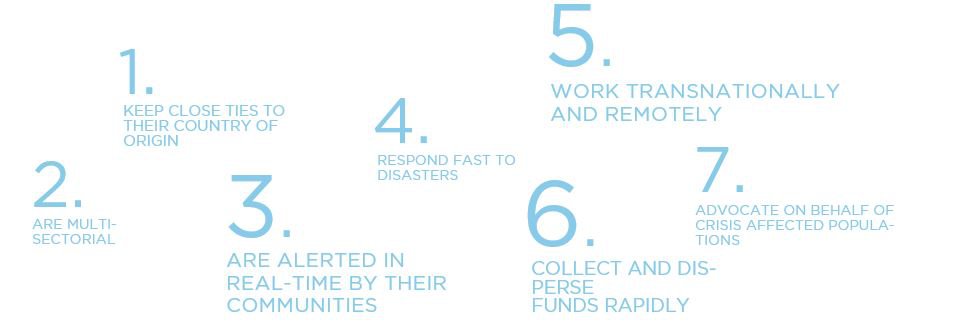Member profile: DEMAC

We feel we have the knowledge of the local context: we have local contacts; we have easy access; we are familiar with structures; this know-how we have is not clear to international NGOs and sometimes they overlook our efforts.” Quote from a member of a Somali diaspora organization
Operational since 2015, H2H Network member DEMAC is a global initiative aiming to enhance coordination among diaspora organizations involved in humanitarian assistance, across diaspora organizations and institutional humanitarian actors. Co-Coordinator Alexandra Singpiel said, "DEMAC challenges traditional ways of working in the humanitarian system in three main ways. First, by enhancing knowledge between diasporas and humanitarian institutions. Second, by increasing awareness of diaspora-led humanitarian interventions. Third, by improving the coordination, communication and coherence of humanitarian responses".
With over 120 members, DEMAC seeks to increase engagement and visibility for diaspora organizations in the humanitarian system through workshops, seminars, peer-to-peer networking events and evidence-based research. DEMAC aims to contribute to a deeper understanding of diasporas as humanitarian actors and their important role in humanitarian response. We asked DEMAC to tell us about their work, the opportunities that membership of the H2H Network brings them, their partnership with diasporas, and how they add to the overall H2H Network’s mission to enable change in the wider humanitarian system.

Why humanitarian coordination?
In 2022, 274 million people globally will need humanitarian assistance and protection – the highest figure in decades (UN/OCHA). Protracted crises, political conflicts, climate-related disasters, and a global COVID-19 pandemic, which shows no signs of abating, are challenging the humanitarian system.
"This is why we at DEMAC believe it to be more important than ever to integrate non-traditional actors such as diasporas into the broader humanitarian system -- as a key way of enabling a more relevant, efficient, and sustainable humanitarian response. Considering diasporas’ transnational identity and close local ties, they play a vital role in the localization agenda, one of the main commitments under the Grand Bargain" explained Raphael Capony, DEMAC Co-Coordinator.
Localization aims to strengthen the resilience of local communities and to support local and national responders on the front lines. According to DEMAC’s research, Diaspora organizations are already following this line; they contribute directly to emergency responses in their home countries, or work closely with local organizations, and community groups by providing technical and financial support.
Too often, as DEMAC’s research has shown, assistance provided by diaspora organizations and the institutional humanitarian actors "often follow parallel tracks, resulting in a lack of mutual understanding and recognition, and thus a lack of coordination and collaboration that would benefit the overall response".
Why diaspora?
"DEMAC works with diaspora organizations involved in humanitarian response, because we believe that including diasporas’ localized expertise in the communication and coordination of a wider humanitarian response can enhance the overall assistance" says Alexandra.
- Members of the diaspora keep often close ties to their families and communities in their country of origin and understand in detail their needs and the context of the situation.
- When a crisis hits, diasporas are alerted in real-time by communities, and collect and disperse funds rapidly. They are therefore often first-responders in crisis settings. In hard-to-reach places where access may be an issue, diaspora networks have a unique advantage due to their local connections.
- Diaspora organizations are heterogeneous – they have different capacities, values and approaches – and can as part of a broader humanitarian community play a valuable and agile role in humanitarian responses.

DEMAC supports its members by developing an operational framework to improve future responses to humanitarian emergencies, including guidelines, tools, and resources. DEMAC facilitates discussions with diaspora organizations and humanitarian actors on how to engage with one another in emergency responses and enhance communication among them.
Raphaël added, “Following DEMAC’s facilitation with institutional actors and Ukrainian diaspora organizations, the Health Cluster in Ukraine has formally invited diaspora organizations to participate in their cluster meetings. Diaspora organizations are now included in Health Cluster coordination meetings and communications. Also, with our technical support as intermediary, several Ukrainian diaspora organizations are currently forming a European coordination platform to increase coordination and communication among them.”
"DEMAC with its unique focus on diaspora humanitarians joined the H2H network as it offers a joint voice and agency to organizations that are specialized in a specific and often narrow field and are (comparatively) small. Strengthening cooperation around humanitarian support services and supporting the visibility of smaller actors in itself is important to co-create a more inclusive humanitarian ecosystem" said Alexandra.
Find out more about DEMAC – Diaspora Emergency Action & Coordination
For more information reach out to the DEMAC Coordinators Alexandra Singpiel (alexandra.singpiel@drc.ngo) and Raphaël Capony (raphael.capony@drc.ngo), and visit DEMAC’s website www.demac.org for updates on diaspora humanitarianism, upcoming events for and about diaspora engagement and an overview of DEMAC’s members and their activities globally. Follow DEMAC on Twitter, LinkedIn, Facebook and YouTube.
Photo @DEMAC 2022, Somali diaspora, Jamil Ghafuri.
Sign up to our newsletter
The latest H2H Network news, impact stories and resources, sent straight to your inbox every month.